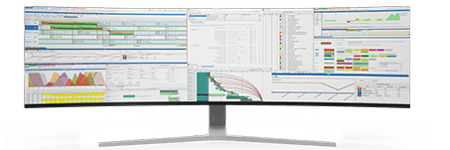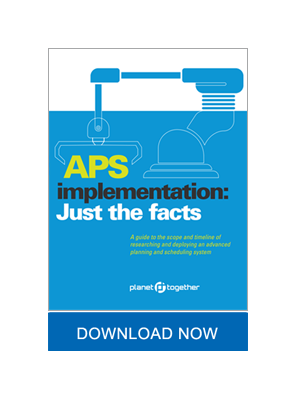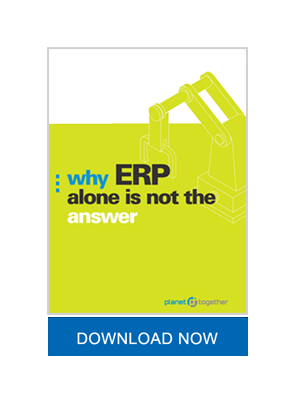
Unlocking Operational Excellence in Pharmaceutical Manufacturing with Big Data and Advanced Analytics
The rise of Big Data and advanced analytics has revolutionized the industry, offering unprecedented opportunities for data-driven decision-making, process optimization, and cost reduction. For Operations Directors, leveraging these technologies is not just an advantage but a necessity to maintain competitiveness.
Integrating tools like PlanetTogether with enterprise systems such as SAP, Oracle, Microsoft, Kinaxis, or Aveva can elevate the application of Big Data and analytics, turning challenges into opportunities.

The Role of Big Data in Pharmaceutical Manufacturing
Big Data refers to the vast and complex datasets generated from various sources, including production equipment, supply chains, quality control processes, and regulatory reporting. In pharmaceutical manufacturing, this data holds immense value, but its potential can only be unlocked with advanced analytics.
Key applications of Big Data in pharmaceutical manufacturing include:
- Predictive Maintenance: Identifying patterns in equipment data to predict failures and schedule maintenance.
- Real-time Monitoring: Ensuring compliance and quality by monitoring production metrics in real time.
- Supply Chain Optimization: Streamlining operations by analyzing procurement, production, and distribution data.
- Process Improvement: Identifying bottlenecks and inefficiencies to improve throughput and yield.

Advanced Analytics: From Insights to Action
Advanced analytics encompasses techniques like machine learning, artificial intelligence (AI), and statistical modeling to extract actionable insights from Big Data. These methods empower pharmaceutical manufacturers to move beyond descriptive analytics (what happened) to predictive (what will happen) and prescriptive (what should be done) analytics.
Examples of Advanced Analytics in Action:
- Predictive Quality Control: AI-driven models can predict product quality based on process parameters, enabling real-time adjustments.
- Demand Forecasting: Machine learning algorithms analyze historical and external data to predict market demand, ensuring optimal production levels.
- Resource Allocation: Advanced algorithms help allocate labor, materials, and equipment efficiently, reducing waste and downtime.

Challenges in Harnessing Big Data and Analytics
While the potential is clear, implementing Big Data and advanced analytics in pharmaceutical manufacturing comes with challenges:
- Data Silos: Disparate systems and processes often lead to fragmented data that is hard to integrate and analyze.
- Regulatory Compliance: Adhering to stringent regulations like FDA 21 CFR Part 11 adds complexity to data management.
- Scalability: Managing and analyzing vast amounts of data requires robust infrastructure and tools.
- Workforce Skills: Adopting these technologies necessitates upskilling employees to interpret and act on data-driven insights.


Integration of PlanetTogether with SAP, Oracle, Microsoft, Kinaxis, and Aveva
To overcome these challenges, integrating advanced planning and scheduling (APS) systems like PlanetTogether with enterprise platforms such as SAP, Oracle, Microsoft, Kinaxis, or Aveva is crucial. This integration bridges the gap between operational data and actionable insights, creating a seamless flow of information across the organization.
Benefits of Integration:
- Centralized Data Management: Integration ensures all data—production schedules, inventory levels, quality metrics, and supply chain data—is centralized and accessible in real time.
- Enhanced Predictive Capabilities: Combined with advanced analytics, integrated systems provide predictive insights, from demand forecasting to equipment maintenance.
- Regulatory Compliance: Automated data logging and reporting simplify adherence to regulatory standards.
- Real-time Decision Support: Operations Directors can access dashboards and reports that highlight key metrics and trends, enabling proactive decision-making.

Big Data-Driven Sustainability Initiatives
Sustainability is becoming a critical focus in pharmaceutical manufacturing. Big Data and analytics play a pivotal role in reducing environmental impact while maintaining operational excellence. For example:
- Energy Efficiency: Monitoring energy consumption data identifies opportunities for reduction.
- Waste Reduction: Analyzing production data highlights inefficiencies that lead to waste.
- Sustainable Sourcing: Supply chain data helps identify and collaborate with eco-friendly suppliers.
When integrated with systems like PlanetTogether and Aveva, manufacturers can develop comprehensive sustainability strategies. Aveva’s capabilities in industrial software combined with PlanetTogether’s scheduling expertise offer a powerful platform for achieving these goals.
Strategic Steps for Implementation
Operations Directors aiming to harness Big Data and advanced analytics should consider the following steps:
- Assess Current Systems: Evaluate existing IT infrastructure and identify gaps in data collection, storage, and analysis.
- Define Objectives: Clearly outline the goals—whether it’s improving quality, reducing costs, or enhancing sustainability.
- Invest in Integration: Partner with providers like PlanetTogether and enterprise platforms to build an integrated, scalable solution.
- Upskill the Workforce: Equip employees with the skills needed to interpret data and utilize analytics tools effectively.
- Monitor and Refine: Continuously monitor results and refine strategies based on data-driven insights.
Big Data and advanced analytics are transforming pharmaceutical manufacturing. For Operations Directors, the ability to integrate tools like PlanetTogether with SAP, Oracle, Microsoft, Kinaxis, or Aveva unlocks a new level of operational excellence. From predictive maintenance to sustainable manufacturing, the possibilities are vast.
The key to success lies in seamless integration, robust analytics capabilities, and a forward-thinking approach to leveraging data. By embracing these technologies, pharmaceutical manufacturers can not only meet today’s challenges but also position themselves for future growth and innovation.
Are you ready to take your manufacturing operations to the next level? Contact us today to learn more about how PlanetTogether and integrated scheduling solutions can help you achieve your sustainability goals and drive success in the pharmaceutical industry.

























LEAVE A COMMENT